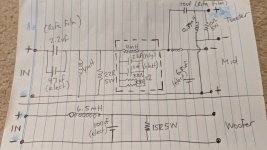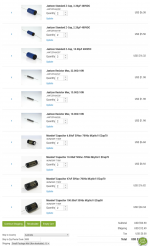Hi All,
I bought a set of 3 way diy speakers incorporating a Seas 8" driver, Alpair 5" midrange and Aura tweeters designed and made by a well known speaker builder. He has used Rifa film in the series and Bennic electrolytic in the parallel circuit. Would it be beneficial to upgrade to a better branded specification capacitors? I know changing may voice them differently. I've attached the crossover schematic.
Thanks for all your help.
I bought a set of 3 way diy speakers incorporating a Seas 8" driver, Alpair 5" midrange and Aura tweeters designed and made by a well known speaker builder. He has used Rifa film in the series and Bennic electrolytic in the parallel circuit. Would it be beneficial to upgrade to a better branded specification capacitors? I know changing may voice them differently. I've attached the crossover schematic.
Thanks for all your help.
Attachments
It's mostly personal preference, if you can (or think you can) hear a difference.
Aluminium electrolytics bypassed with film caps should give you the best of both worlds (larger size in a small space, and the better sounding part as well, if you can hear a difference).
It's one of those arguments that will go on forever.
Only way you will know is to buy some other parts and listen for yourself.
Aluminium electrolytics bypassed with film caps should give you the best of both worlds (larger size in a small space, and the better sounding part as well, if you can hear a difference).
It's one of those arguments that will go on forever.
Only way you will know is to buy some other parts and listen for yourself.
The 15R in parallel with the woofer may be due for replacement, since it burns
significant power and is only rated at 5W. Check the 22R and the 10R resistors as well.
significant power and is only rated at 5W. Check the 22R and the 10R resistors as well.
Last edited:
Replacing electrolytics with metallized film capacitors means not having to worry about the lifespan of the capacitor after it has been replaced. This is a good thing. However, in some designs, the ESR of the electrolytic has been factored into the crossover and replacing it with a lower ESR capacitor (ie metallized film, film & foil) alters the desired response.
In a woofer circuit, a metallized capacitor is going to be much larger than an electrolytic. This larger size makes it more susceptible to EMI interference via domestic electrical wiring (50/60Hz plus harmonics).
Replacing any capacitor with an audiophile-approved brand makes sense when the possibility of selling said gear to audiophiles is a real consideration. If not, save your money for music.
In a woofer circuit, a metallized capacitor is going to be much larger than an electrolytic. This larger size makes it more susceptible to EMI interference via domestic electrical wiring (50/60Hz plus harmonics).
Replacing any capacitor with an audiophile-approved brand makes sense when the possibility of selling said gear to audiophiles is a real consideration. If not, save your money for music.
So I've got two different quotes using two different brands of Polypropylene capacitors. Jantzen standard Z Cap or Mundorf M-CAP EVO for the series. Anyone used either?
Mundorf Lydic ECap bipolar in the parallel on both quotes.
Both quote are the same when you incorporate the exchange rate.
Mundorf Lydic ECap bipolar in the parallel on both quotes.
Both quote are the same when you incorporate the exchange rate.
Attachments
I've attached the crossover schematic.
Are you sure that you have correctly sketched the crossover filter?
I'd go with the Jantzens over the mundorfs.
And why not buy local ?
SpeakerBug
A quick look at your jantzen sheet suggests the local speakerbug guy is cheaper by the time you figure in usd to au conversion.
And why not buy local ?
SpeakerBug
A quick look at your jantzen sheet suggests the local speakerbug guy is cheaper by the time you figure in usd to au conversion.
Funny is i have 4 pages currently open, soundlabsgroup, parts-express, partsconnexion, willys hifi & speakerbug haha
Just replace the electrolytics and spend the rest of your money on wine, women, & (most importantly) song....
Funny is i have 4 pages currently open, soundlabsgroup, parts-express, partsconnexion, willys hifi & speakerbug haha
Gotta love intercontinental research at your fingertips 🙂
Do it blind - somehow. Cause changing the caps yourself, will simply make a change that you will create yourself, cause you wish for a change. Sorry to say... but this is what you will most likely statistically experience 😉
Will complete one speaker xover then a blind test. At present, the speakers sound fantastic but I know more detail in the top end can be improved. The speakers have a great design with a great design crossover designed by a speaker engineer who was my old electronics teacher from school days. I believe he's well known from around the world for his experience in crossover designs etc. They have been compared sonically to $5000 speakers and they **** all over them. Unfortunately, they have low end caps - resistors. The guy who built them has told me that he has tested most capacitors and there's nothing wrong with Bennic electrolytics & Rifa polypropylene caps. I've ordered Jantzen z polypropylene caps with Mundorf electrolytics. If there's no difference then at least I know there's quailty components in the crossovers. I couldn't imagine a top end speaker company using cheap caps & resistors in their crossovers or is it marking. I will find out ��
In discussions of Studer tape recorders over at tapeheads.com, there are SO many reportings of failed Rifa caps (and subsequent damage) that I'd be be VERY wary of using those for anything!
Some expensive products, may use cheaper components - but if they do the job - we love them. The designer is the one that has to wheigh the options, so that a given result is optained. And here, it's not always the most expensive components that win - but rather the best component for a given "job".The guy who built them has told me that he has tested most capacitors and there's nothing wrong with Bennic electrolytics & Rifa polypropylene caps. I've ordered Jantzen z polypropylene caps with Mundorf electrolytics. If there's no difference then at least I know there's quailty components in the crossovers. I couldn't imagine a top end speaker company using cheap caps & resistors in their crossovers or is it marking. I will find out ��
When I bought my tweeters - I thought eeww... cause they're made of plastic - but they work great - so I like them now 😀
Yes, but that doesn't mean that he is always correct! Aging may show a certain component was a poor choice; technology advances since the design may trump the original designer's choice.The designer is the one that has to weigh the options, so that a given result is obtained.
Indeed. I remember that there was a offering to adjust and upgrade my old Musical Fidelity amplifier, where they gave it a check-up and replace components with better ones, where needed - both because of age but also because it would sound better. Could be the same story here.
Last edited:
- Home
- Loudspeakers
- Multi-Way
- Would changing to better capacitors make a difference


